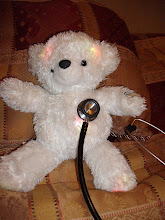How does eczema present?
It is characterised by dry skin, itching and excoriation (scratches). In poorly controlled cases
 it can lead to thickening and scarring of the skin. Any part of the skin may be involved but common sites are face and skin creases including back of the knee (as seen in the picture). Eczema (atopic eczema) may present at any age but in about 75% of the children some signs pointing to the diagnosis of eczema are present by 6 months of age.
it can lead to thickening and scarring of the skin. Any part of the skin may be involved but common sites are face and skin creases including back of the knee (as seen in the picture). Eczema (atopic eczema) may present at any age but in about 75% of the children some signs pointing to the diagnosis of eczema are present by 6 months of age.What causes eczema in children?
What causes eczema is not clear but it tends to run in families. Other substances such as dust, pets, wool and rarely certain diet can also trigger eczema.
Treatment
Children with eczema have a dry, irritable skin. Constant care is required to prevent flare ups. Here is a list of things which you can do to keep your child’s eczema under control:
- Avoid wool and acrylic materials.
- Avoid perfumed products and strong cleansers.
- Use mainly cotton clothes. Cotton materials rarely irritate skin.
- Use very mild soap and avoid bubble bath.
- Use plenty of emollients (such as E45) – they should be applied at least twice daily even when the skin is free of eczema.
Use of topical steroids (applied over the skin)
These are essential part of management but should be used with caution. Parents should understand that the overuse of topical steroids is unlikely if it is used appropriately where and when there is a flare up. Ointment based, low potency topical steroids should be used as prescribed by your doctor for a flare up. Oral steroids are usually not given for eczema.
Severe cases
Hospital admission for wet dressing may be needed in severe cases. Antibiotics (given by mouth) may be necessary for weeping eczema (suggestive of bacterial infection). Your doctor may prescribe a sedative for the child to take at night to help with itching as itching is common at night. Dietary exclusion should only be undertaken in severe cases and only if parents report worsening of eczema after eating certain food products. If anyone is interested in knowing the details about dietary exclusion, it will be published later on this blog.
It is important to keep your child’s eczema under control to avoid severe flare ups. Therefore, use emollients liberally and do not wait for the eczema to get worse. During flare ups do not hesitate to use topical steroids as advised by your doctor. In most cases good control of the condition is achievable with above mentioned measures. You can only wait and see if your child grows out of it.

No comments:
Post a Comment